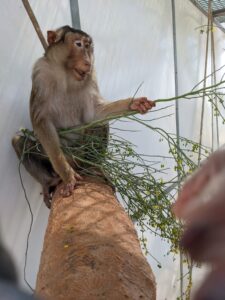Key Details: Pig-Tailed Macaque Monkeys
 Species: Macaca nemestrina
Species: Macaca nemestrina
Other common names: southern pigtail macaque, Sundaland pig-tailed macaque or Sunda pig-tailed macaque.
Geographic locations of wild populations: Indonesia, Malaysia, Thailand.
Import status: All pigtails at the Washington National Primate Research Center are purpose-bred for research.
Conditions negatively impacting wild pig-tailed macaque populations: Human encroachment into natural habitats, climate change, pollution, oil and gas production, human recreational activities, hunting and trapping.
Source of pig-tailed macaques studied at the University of Washington: All pig-tailed macaque monkeys involved in research at the University of Washington were bred expressly for involvement in health research.
Diseases and Disorders That Require the Study of Pig-Tailed Macaque Monkeys
- Women’s Health – Like humans, pig-tailed macaques experience menopause, menstrual cycles and give birth throughout the entire calendar year. We also share similar reproductive anatomy making these animals an important model to combat illnesses, such as chlamydia, that impact women around the globe.
- Health Issues Associated with Premature Birth – Research in pig-tailed macaques helps researchers understand and counteract premature birth and neonatal hypoxia. Neonatal hypoxia, the tragic result of oxygen deprivation shortly before or after birth, affects roughly 2-3 out of 1,000 live human births in the U.S. each year.
- Zika Virus Research – The study of Zika virus transmission during pregnancy occurs in pig-tailed macaques because their immune system is similar to humans.
- HIV/AIDS Research – HIV, the virus that causes AIDS, impacts the brains of both humans and pig-tailed macaques in a similar way. People with HIV are living longer, healthier lives thanks to past research in pig-tailed macaques.
- Valley Fever Research – Like humans, pig-tailed macaques are uniquely susceptible to Valley fever, a disease caused by inhaling a soil-dwelling fungus. This means these animals play a crucial role in the fight against Valley Fever, a growing health threat exacerbated by increasing global temperatures.
- Aging and Social Behavior Research – There is growing evidence that pig-tailed macaques are a highly valuable research model for the study of aging and certain social behaviors where animal/human parallels exist.
Generated in collaboration with Americans for Medical Progress
